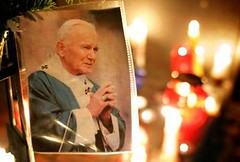There have been lots of wonderful things said about Pope John Paul II in the days since his death. One of the most interesting and apt of them came from Archbishop Rowan Williams, who described John Paul's last days as a "lived sermon."
In the following, we are encouraged not to dwell on "the frailty of his last years" but on the vitality and action of his early pontificate. I think this is wrong. I think JP2's most powerful witness might well be the frailty of his last years, and particularly of his last days. Of course, we ought not to forget the vitality and action of his early pontificate, but the way he died spoke beautifully of the "culture of life" and was a moving witness to our Lord's passion and death. John Paul in his final days was like a sheep, which before its shearers is silent... quite literally silent, as John Paul apparently had great difficulty speaking as he died.
-------------
Pope John Paul II: His legacy for the church, and the world
John I. Jenkins and John Cavadini
The Boston Globe
Monday, April 4, 2005
NOTRE DAME, Indiana
Among the inspirations of the life of Pope John Paul II was his frequent
reference to the "civilization of love." It was an ideal that sparked the
imagination. Yet it was also a concept consistent with the example of his life
in a culture that is awash at times in cynicism, uncertainty and materialism.
He showed us how to live a life grounded in prayer, but also in reconciliation.
His outreach to the Jewish people, for example, was remarkable at a time in
history when ethnic divisions sometimes threatened the world on a broad level.
He spoke of a special relationship between the Jews and the Church and insisted
that the Old Covenant had never been revoked. His words put forth possibilities
for theologians that are yet to be fully explored.
In one special moment, the pope told an audience of Jews that he regarded them
as "our brothers and sisters in the Lord." Surely this was part of his vision
of a civilization of love.
And in a time when society seems to have lost its ear for the ideals of
procreation and their intrinsic connection to married love, the pope spoke of
the "nuptial meaning of the body" and upheld the values of Pope Paul VI's
controversial encyclical, "Humanae Vitae."
He worked to put the encyclical in a larger context. In his civilization of
love, the procreative ethic and an ethic of seamless love would reject the
negativity of abortion and the refusal of societies to guarantee the education
and health of all their children.
These were not popular views in parts of Western civilization, yet even critics
admired his fortitude and his recognition of heroic possibility in the
aspirations of humanity.
In a self-centered culture, this pope bore witness to service, to personal
sacrifice and the humanizing values rooted in love.
For some, the lives of the saints might seem old-fashioned and certainly a
private domain of the church. But in the pope's civilization of love they were
sources for healing cultures, because they represented the greatness of human
possibility. He once spoke of the way in which Catholic and non-Catholic
Christians died together in Uganda, referring to the "ecumenism of the saints
and of the martyrs," saying that the "communio sanctorum speaks louder than the
things that divide us."
Yes, in the words of the cliché, this pope was a Catholic. But he saw heroic
witness in any people who stood for goodness and hoped for the renewal of
civilization.
So John Paul II could speak in the conviction of the absolute, and hold to
tenets of Catholicism that rankled others, yet avoid triumphalism and
superiority, tendencies that would be blind to the courageous witness of
others. In this, he moved inexorably toward a civilization of love, inspiring
others, particularly young people, to lives of joy and hope.
We should not be focused on the frailty of his last years, but on the incredible
vitality that he brought to his mission during most of his tenure. He went
everywhere, not just centers of Catholicism, whether the American Midwest or a
former Soviet republic or Fidel Castro's Cuba. In his 26-year papacy, he made
more than 104 trips outside Italy, taking in 129 of the world's 191 independent
states. He held talks with more than 1,500 heads of state or government.
His great intellectuality, as expressed in the 14 encyclicals he wrote and 100
other major documents, was an infusion of energy to Catholic intellectual
thought, and he was a powerful influence for all of us at Catholic
universities.
For decades the impact of John Paul II's papacy will be discussed on these
campuses and throughout the world. What remains to be seen is whether his
civilization of love can be realized. It will be food for thought in these
coming days as he is remembered and his image crosses millions of television
screens once again.
The pope did not expect his bold vision to be achieved either quickly or
painlessly, but it begins in the hearts and souls of every one of us. John Paul
II believed in the power of ideals and simple human warmth to inspire a sense of
heroic possibility latent in all of us, Catholic and non-Catholic alike.
He was a gift to Catholics. He was a gift to the world.
(Rev. John I. Jenkins, C.S.C., is president-elect of the University of Notre
Dame. John Cavadini is chair of the theology department at Notre Dame.)
Monday, April 04, 2005
Subscribe to:
Post Comments (Atom)


No comments:
Post a Comment